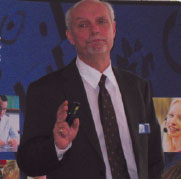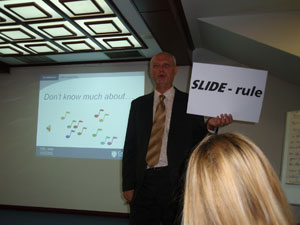About Gary Anderson

Gary Anderson was Pedagogical Director of the language program of the former American Center in Paris, and President-elect of TESOL France when he joined Cambridge ELT as International Teacher Trainer based in Paris.
He has given talks in over 50 countries on five continents, including at TESOL International and IATEFL UK. In this blog, Gary writes about the events he attends and shares some of the ideas and tips that he gives in his talks.
Blog posts
- On the Road with Gary Anderson in…Slovakia
- On the Road with Gary Anderson in…Italy
- On the Road with Gary Anderson in…Lithuania
- On the Road with Gary Anderson in…Romania, Greece and the Czech Republic
- On the Road with Gary Anderson in …Kazakhstan
- On the Road with Gary Anderson in …Switzerland
- On the Road with Gary Anderson in …Serbia
Gary's upcoming travels
- Romania: Cambridge Day, Bucharest; February 27
- Poland: Workshops in Katowice, Krakow, Szczecin, Gdansk; March 10–17
- Bosnia: Workshops in Mostar and Bijeljina; March 25–26
- Croatia: Workshops in Slavonski Brod and Osijek; March 29–30
- UK: IATEFL, Harrogate; April 7–11
- Russia: Workshops in Moscow, Nizhni, Saratov; April 11–15
- Belgium: Cambridge Day, Brussels; April 24
- Netherlands: English for Schools Day, Utrecht; April 28
Sign up for RSS feed
Read Gary's latest blog post as soon as it appears!
Blogs by Cambridge authors
Follow your favourite Cambridge authors here:
- DCBlog, David Crystal
- Bob Dignen's blog on Professional English Online
- That'SLife, Gavin Dudeney
- Andy Hockley's blog
- The Spelling blog, Johanna Stirling
On the Road with Gary in …Italy
Back in (unusually cold and snowy) Paris from the Cambridge ELT sales conference in Sorrento (on the Amalfi coast across the bay of Naples from…Naples and Mount Vesuvius) where I was meeting with colleagues and planning my upcoming travel for the first part of this New Year Twenty Ten. Have a look at my upcoming travel list next to this blog to see if I might be coming to your country.
I'm going to have to prepare lots of new workshops for those trips – and will try to find theme songs for each workshop since I like to use songs to set the tone and introduce the subject. And also because, as we all know, students have different learning styles – visual, auditory, kinaesthetic ('Different strokes for different folks', as the hippies used to say) – and for auditory learners, music can help them focus and better remember what the workshop or class was all about. For example, when I do a workshop on 'Speaking: Does Practice make Perfect?', I like to use the Rolling Stones cover of the old Chuck Berry rock 'n' roll song Carol to make the analogy of practicing speaking in the classroom before going out into the real world being like practicing dancing before hitting the dance floor: I'm gonna learn to dance (speak) if it takes me all night and day!

Do you ever have music playing in the classroom as your students arrive? I used to like to have music (usually with English lyrics) playing as it helps students get into the mood for English and can raise or lower (sometimes necessary to calm down kids) their energy level.
I also like to use music to 'time' pair work or group work activities as well as serve as background music because sometimes pairs or groups can become distracted from the task if they hear other pairs / groups making too much noise and having too much fun. I especially like to use U2's With or Without You when talking about self study / independent learning. First, it's a perfect song for teachers: I'm going to give myself away / With or without you because that's what dedicated teachers do – give themselves away to / for their students. But also because I find it helps make the point that students have to learn on their own without the teacher, 'with and without you', right!? Tell me the truth? Did any of you learn all your foreign language only in the classroom? Of course not! You also did like I did (do) learning French: reading, listening to music and watching TV and movies and, as I used to tell my students in Paris, eavesdropping when they hear foreigners speaking the target language in the street or on the bus or Metro. Anyway, I find the music and Bono's voice very soothing in the first 3 minutes of With or Without You, which is when I usually stop it – before The Edge comes on with a loud lead guitar solo that really wakes you up.
Many course books come with songs – but maybe especially if you're teaching tween-agers or teenagers and they don't 'appreciate' the song with the course, you might have them suggest an alternative song in English (but if it's a rap song, be careful that the lyrics are 'parent proof' and not vulgar).
There are of course lots of other ways to use music in the classroom: for pronunciation practice, maybe especially for intonation; listening along while reading the lyrics; to introduce a grammar point (try Led Zeppelin's Thank You or the classic If I had a hammer for the second conditional); etc.
What about you? Do you use music in the classroom? If so, how? If not, you might try it…And if you have any suggestions for some good songs for my new talks, please send 'em along!
Gary Anderson, Cambridge ELT International Teacher Trainer
PS In the picture next to this blog, I'm using an old song called Wonderful World by Sam Cooke. Can you guess my pedagogical subject that the song is leading into? Might write about that in an upcoming blog…


